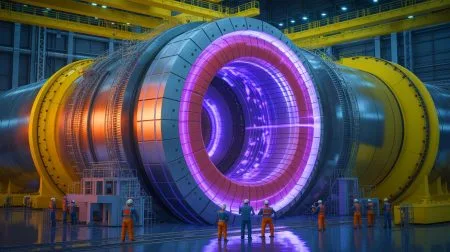| IN A NUTSHELL |
|
Quantum computing has long been touted as the future of computational power, promising to solve complex problems that current supercomputers cannot tackle. A recent development from researchers at Chalmers University of Technology in Sweden marks a significant stride toward this future. They have engineered an ultra-efficient amplifier that activates solely for qubit data reading, reducing energy consumption by a remarkable 90% compared to existing models. This breakthrough not only conserves energy but also stabilizes the delicate quantum states essential for quantum computing. As we explore this innovation further, it is clear that the journey to more powerful and efficient quantum systems is rapidly advancing.
Quantum Superposition: Power Beyond Binary
Traditional computers operate using bits that exist in one of two states, 1 or 0. In contrast, quantum computers leverage qubits, which can embody 1 and 0 simultaneously due to a phenomenon known as superposition. This capability enables quantum computers to process a vast array of possibilities at once. For instance, a system with just 20 qubits can theoretically manage over a million different states concurrently. This extraordinary potential allows quantum computers to tackle problems that are currently insurmountable for classical supercomputers, such as complex drug discovery, advanced cryptography, and intricate logistical challenges.
The advancement in quantum computing technology, particularly in amplifiers, is crucial for harnessing the full potential of superposition. By ensuring that qubits can maintain their superposed states without interference, researchers are paving the way for quantum systems that can perform tasks with unprecedented speed and complexity.
The Delicate Role of Amplifiers in Quantum Computing
Reading the fragile states of qubits demands ultra-sensitive amplifiers that can boost faint signals for processing. However, these amplifiers traditionally consume substantial energy, generating heat that can disturb the qubits in a process known as decoherence. This disruption often leads to data loss, posing a significant challenge in maintaining the integrity of quantum computations.
The innovative amplifier developed by Chalmers University addresses this issue through a unique design that conserves energy. The amplifier remains dormant until it detects a qubit signal, at which point it activates to amplify the data before shutting down again. By utilizing a pulse-based approach, this amplifier significantly reduces energy consumption, operating at just one-tenth of the power required by current models. This innovation minimizes heat production and electromagnetic noise, preserving the qubits’ delicate states and enhancing the stability and performance of quantum systems.
Breakthrough: Energy-Efficient Amplifier Achieved
This new amplifier represents a milestone in the quest for more sustainable quantum computing technologies. “This is the most sensitive amplifier that can be built today using transistors,” says Yin Zeng, the lead researcher at Chalmers. The development could substantially impact the scalability of quantum computers, which require increased numbers of qubits to enhance computational power and tackle increasingly complex calculations.
The research team, supported by the Wallenberg Center for Quantum Technology, has demonstrated that their amplifier maintains optimal performance while drastically reducing power usage. This achievement suggests a promising future where quantum computers can be scaled up without the prohibitive heat generation associated with traditional amplifiers. As the number of qubits increases, so too does the potential for quantum computing to revolutionize numerous fields, from medicine to artificial intelligence.
Smarter, Cooler, Faster: A Pulse-Operated Solution
The pulse-operated design of the Chalmers amplifier sets it apart from existing technologies. By activating only when needed, the amplifier minimizes unnecessary energy expenditure and heat production. Jan Grahn, a researcher involved in the project, explains that this is the first demonstration of low-noise semiconductor amplifiers for quantum readout in pulsed operation, which maintains performance while reducing power consumption.
This advancement is made possible through the use of genetic programming, which enhances the amplifier’s responsiveness to qubit pulses. The amplifier can now react in just 35 nanoseconds, ensuring that it keeps pace with the rapid demands of quantum computations. Researchers have also developed novel techniques to measure the noise and amplification of these pulse-operated amplifiers, further validating their effectiveness.
As quantum computing continues to evolve, the development of energy-efficient technologies like this amplifier is crucial. These innovations not only improve the performance and scalability of quantum systems but also bring us closer to realizing the full potential of quantum computing. With such advancements, one might wonder: how soon will it be before quantum computers become a staple in solving the world’s most complex challenges?
Did you like it? 4.3/5 (23)









Wow! 90% less power? That’s like the ultimate energy saver mode! 🔋
Can anyone explain how this “genetic programming” works? Sounds fascinating!
I’m skeptical. Are there any independent studies verifying these claims?
Thank you for shedding light on this breakthrough. Quantum computing is the future! 🌟
Does this mean my computer will finally stop overheating? 😂
How do they ensure that the amplifier doesn’t activate by mistake?